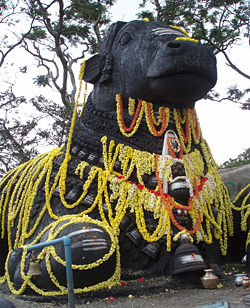Nandi (Sanskrit: नंदी), is the bull which Siva rides and the gate keeper of Siva and Parvati in Hindu mythology.
Description
Nandi is a white bull usually represented of colossal size. The white color of the bull symbolizes purity and justice.
Origin
According to Some Puranas, Nandi was born out of the right side of Vishnu resembling Shiva exactly and given as a son to the sage Salankayana. Some puranas mention him as the son of the sage Silada who got him by the grace of Shiva.
Myth
It was Nandi who cursed Ravana (the demon King of Lanka) that his kingdom would be burnt by a monkey (Vanara). And later Hanuman burnt Lanka when he went in search of Sita, who was kept prisoner by Ravana in Ashok Vatika. In one puranic story, it is stated that once Siva and Parvathi were playing a game of dice. For any game there has to be an umpire, who has to declare who is the winner. Siva and Parvathi agreed to have Nandi (the divine bull) as the umpire. Nandi is a favorite of Siva, as he is Siva's vehicle. Although Siva lost the game, Nandi declared him the winner. It is stated that Parvathi was indignant over Nandis partiality for Siva and cursed him that he should die from an incurable disease. Thereupon Nandi fell at the feet of Parvathi and pleaded for forgiveness. "Mother forgive me. Should I not show at least this amount of gratitude to one who is my master? Is it not humiliating for me to declare that my master has lost the game? To uphold his honor I no doubt uttered a lie. But am I to be punished with such severity for so small an offence?" Nandi prayed for forgiveness in this manner. Parvathi forgave Nandi and taught him the means to atone for his lapse. She told him. "The Chaturdasi day in the month of Bhadrapada is the day when my son's birthday is celebrated. On that day you have to offer to my son what pleases you most (green grass)". This means that one atones for one's sins when one offers to the Lord what is most pleasing and enjoyable to him. For Nandi the most enjoyable and relishing food is green grass. As directed by Parvathi Nandi worshipped Ganapathi by offering green grass. Nandi was then relieved of his dreaded disease. His health improved and by the grace of Parvathi he was redeemed.
When the positive forces, the devas, and the negative forces, the asuras, joined together on a rare occasion to churn the ocean with a mountain to obtain the nectar of immortality they utilized Vasuki, the serpent, as the rope. The devas pulled from one end and the asuras from the other. Vasuki was upset during the process of this churning, and vomited up a poison- Halaahalaa- which became human karma. This "poison" was so dangerous that none of the devas or asuras wanted to go near it. It was extremely sticky and coming into contact with this poison, i.e, human karma, would drag the divinity down to the realms of human suffering and ego. As everyone else ran away, Lord Siva, followed by Nandi, came forward to help as he was the only one who could counteract this deadly poison. Siva took the poison into his hand and drank it, the descent of the poison was in turn stopped at His throat, by His divine consort. Siva is therefore also known as the blue-throated One (Neelakantha) and Vishakantha (the One bearing poison in His throat). Nandi saw some of the poison spill out of Siva's mouth and immediately drank if off the ground. The devas and asuras watching were shocked and wondered aloud what would happen to Nandi. Lord Siva calmed their fears saying, "Nandi has surrendered into me so completely that he has all my powers and my protection".
Rituals
Women visit images of Nandi, bringing floral offerings, and touch the stone. Their prayers are for fertility. Additionally, it is also considered a custom among some to whisper the fact of their visit, to that shrine, while requesting the faithful attendant to inform his master of the same.
Temples
Temples venerating Siva and Parvati display stone images of a seated Nandi, generally facing the main shrine. There are also a number of temples dedicated solely to Nandi.
Largest Nandis in India
- Lepakshi, Andhra Pradesh
- Thanjavur, Tamil Nadu
- Chamundi Hills, Mysore, Karnataka
- Bull Temple, Bangalore, Karnataka
- Rameswaram, Tamil Nadu
- Hoysaleswara Temple, Halebidu, Karnataka
- Shanthaleswara Temple, Halebidu, Karnataka
References
- Dictionary of Hindu Lore and Legend (ISBN 0-500-51088-1) by Anna Dhallapiccola

